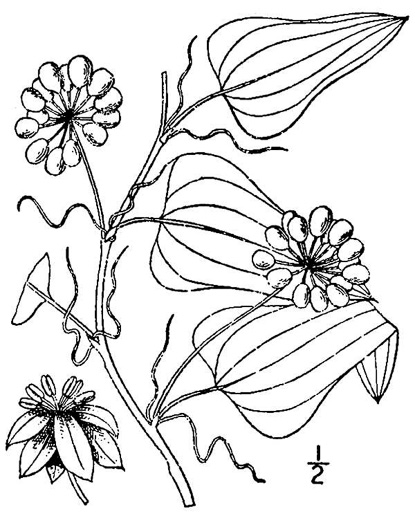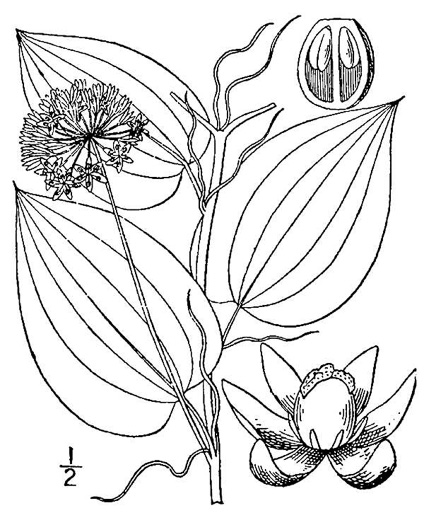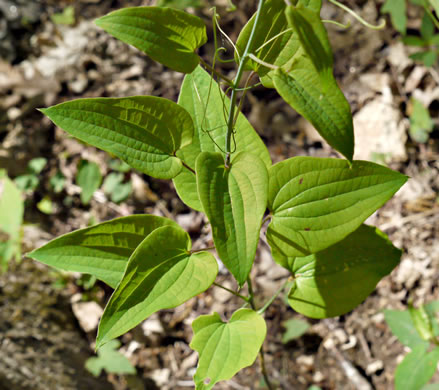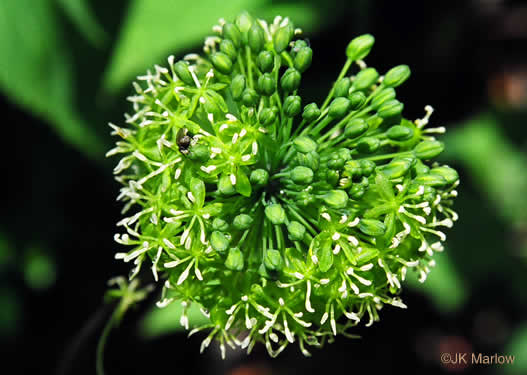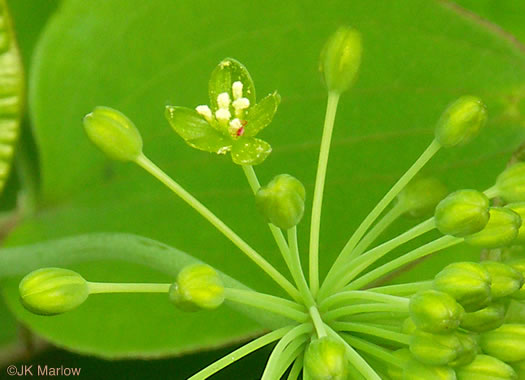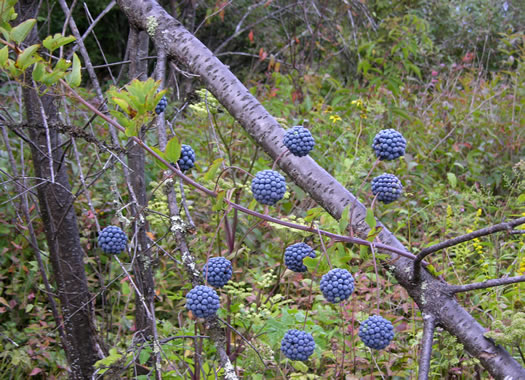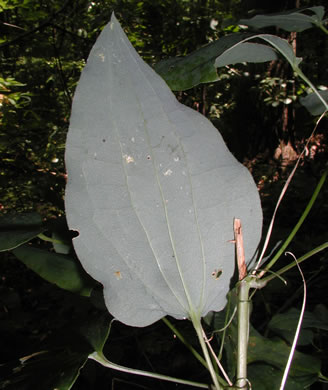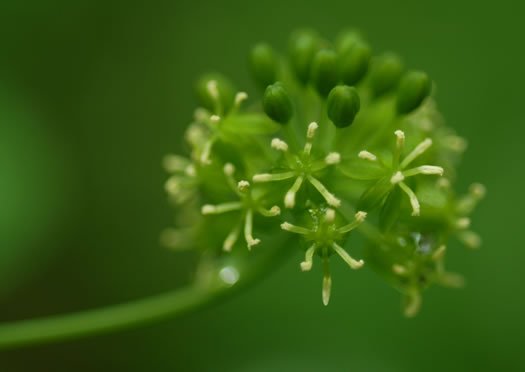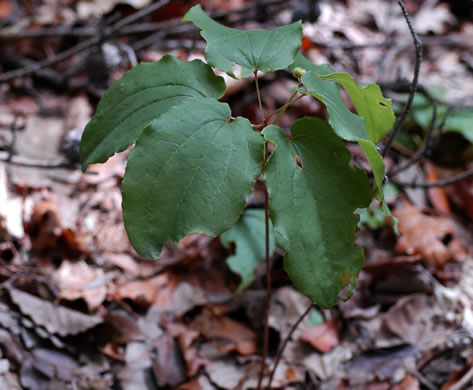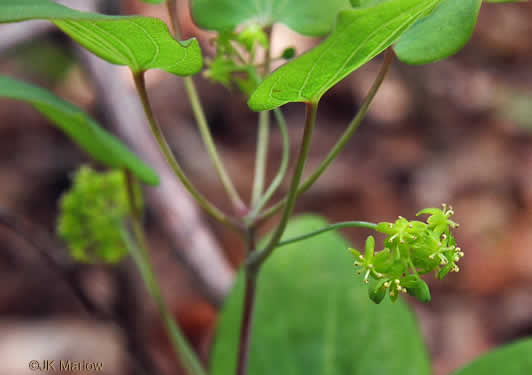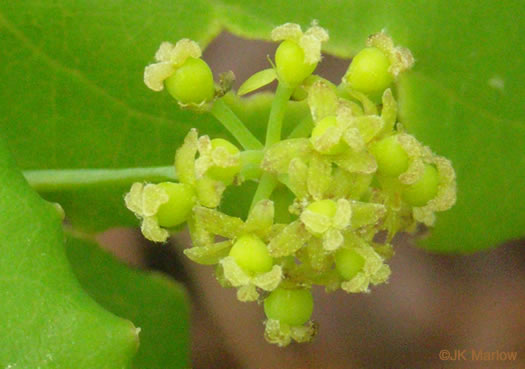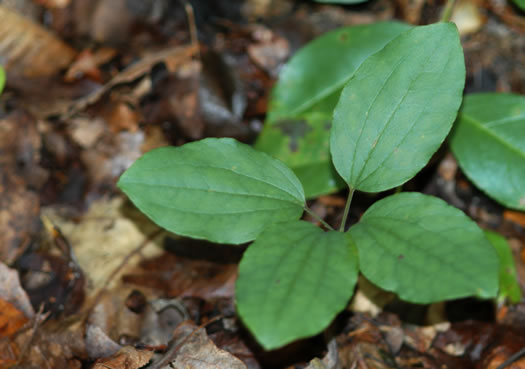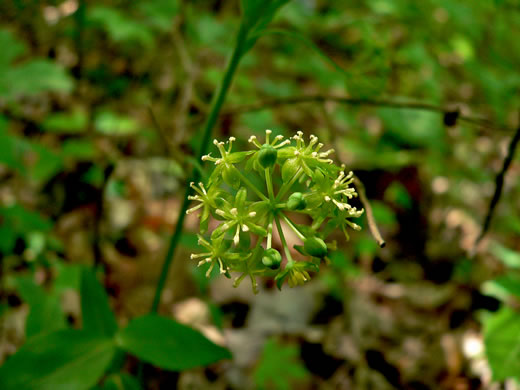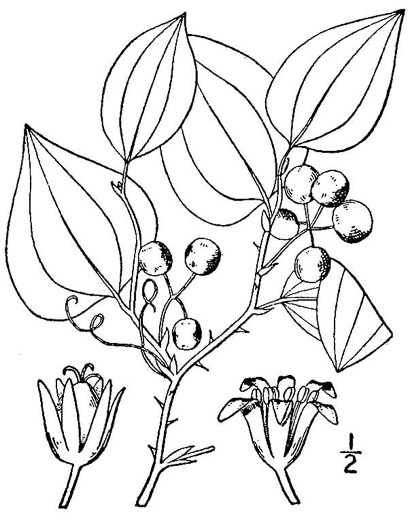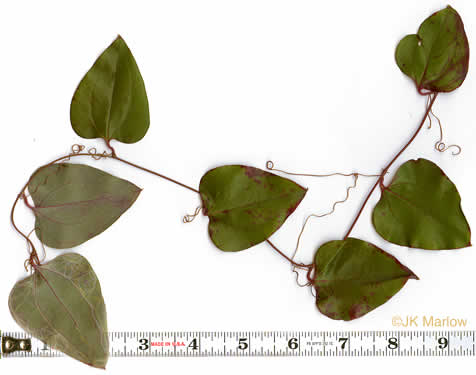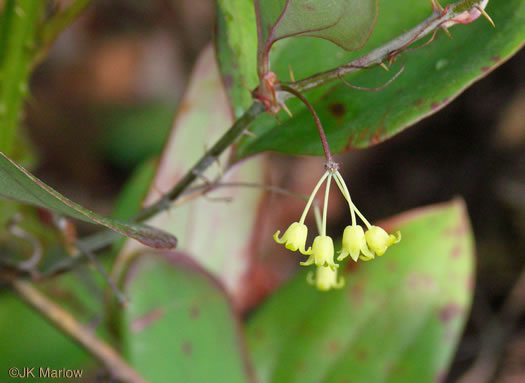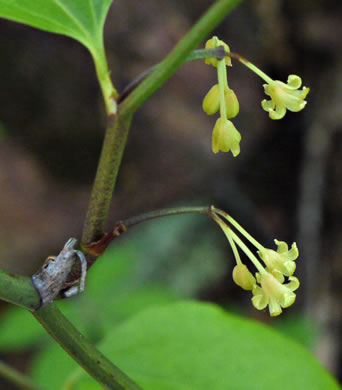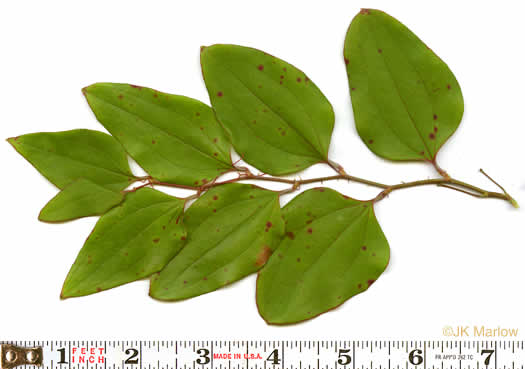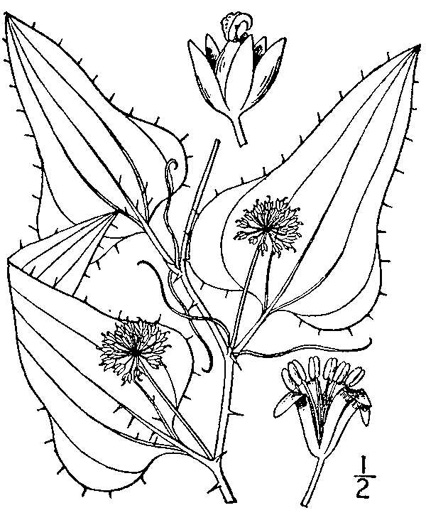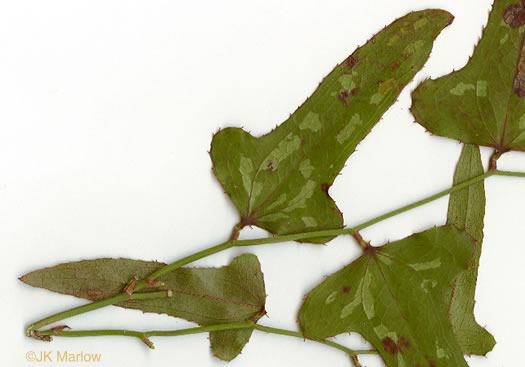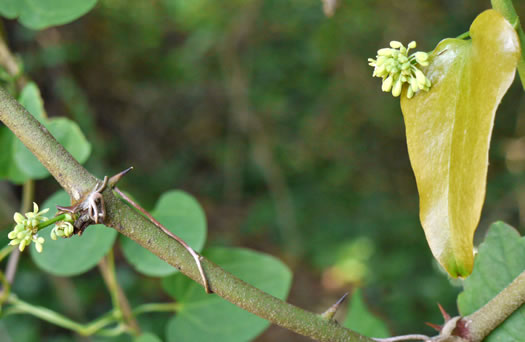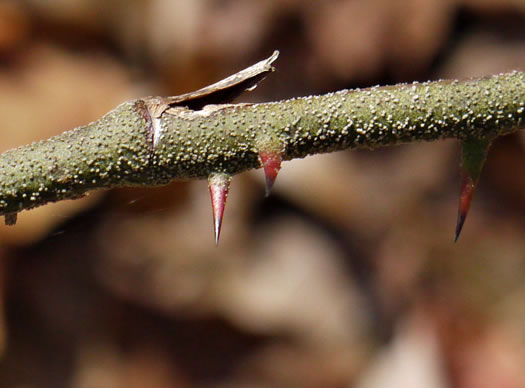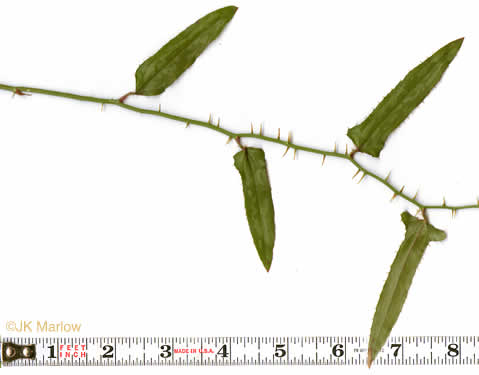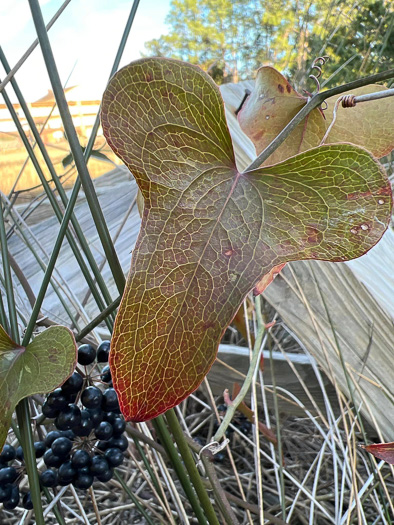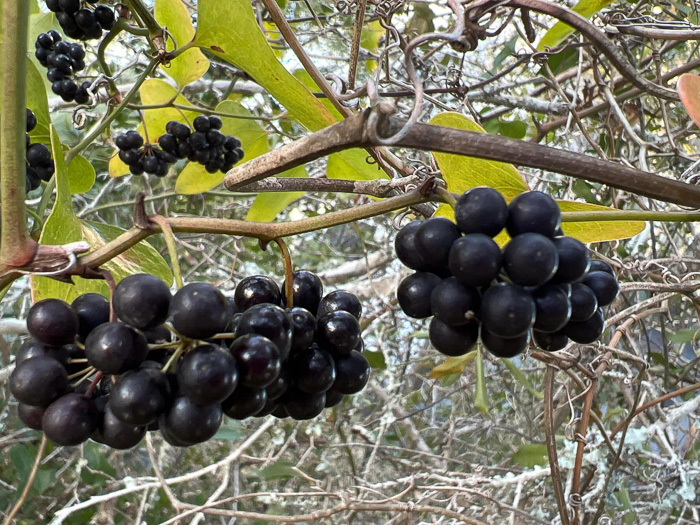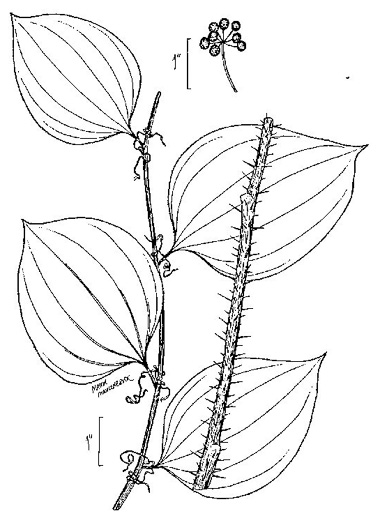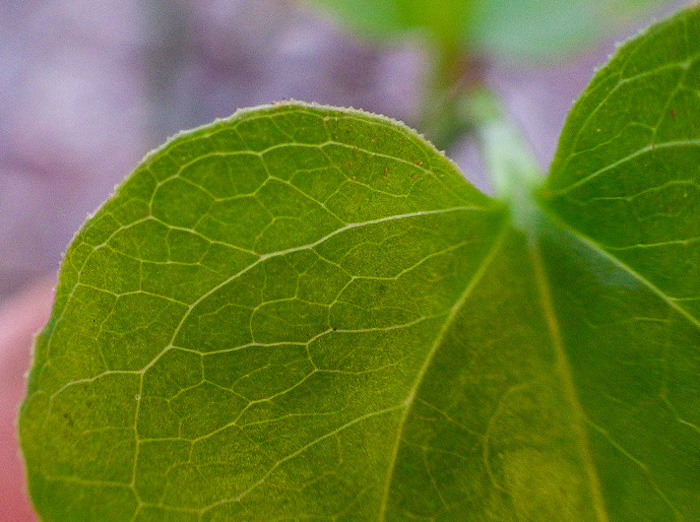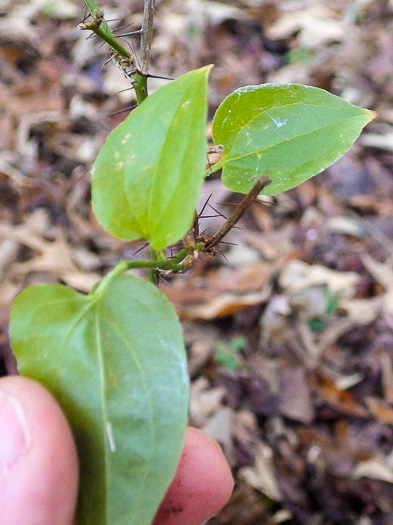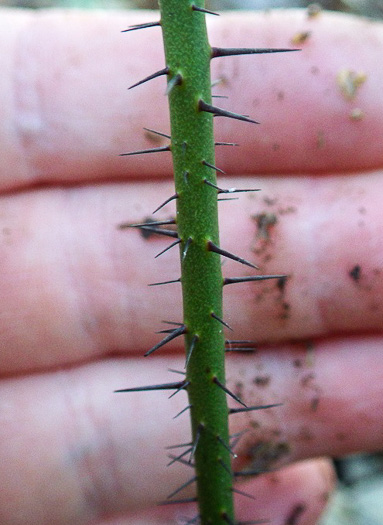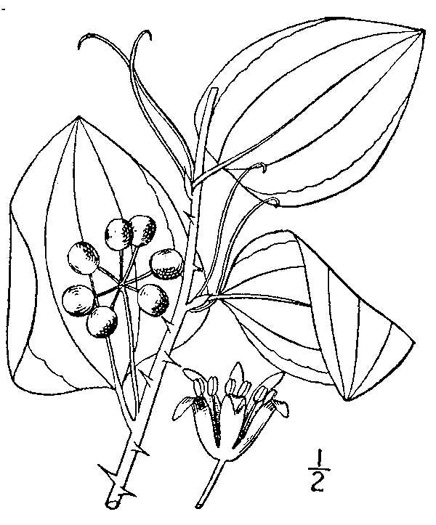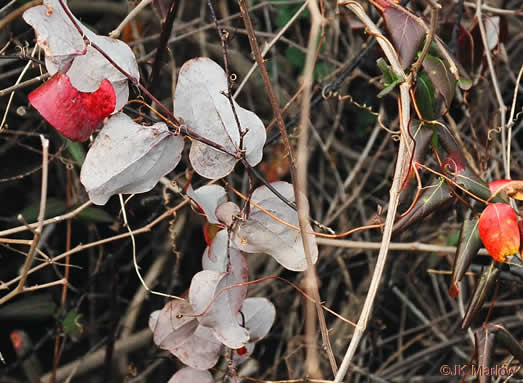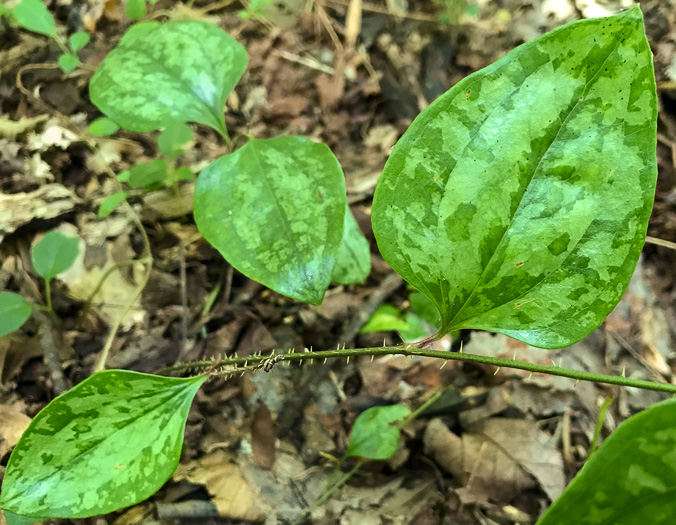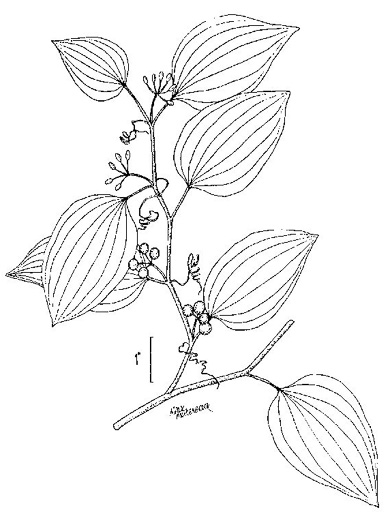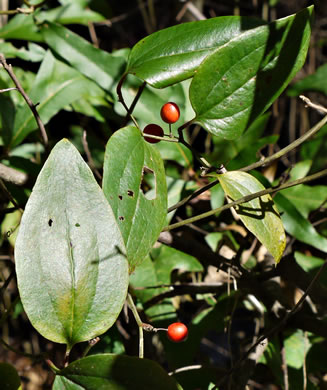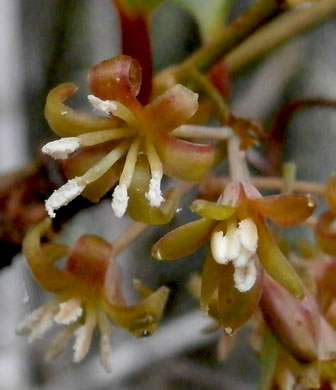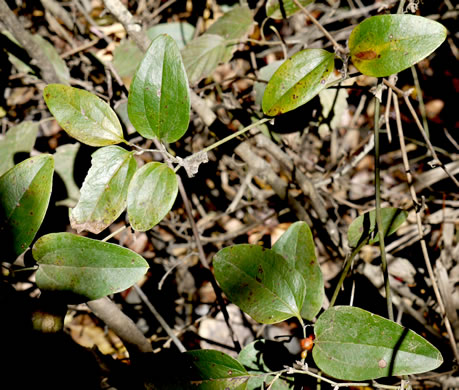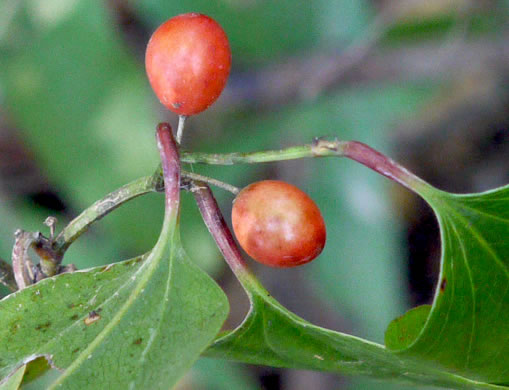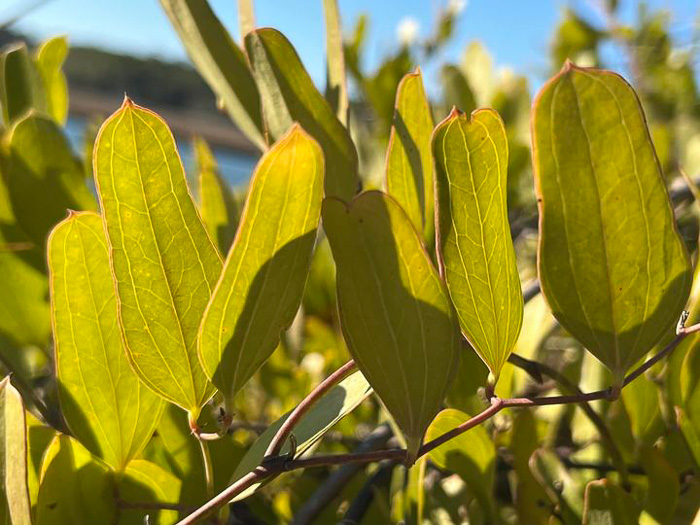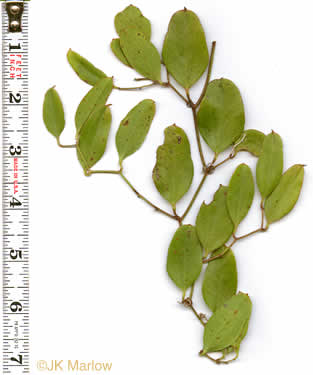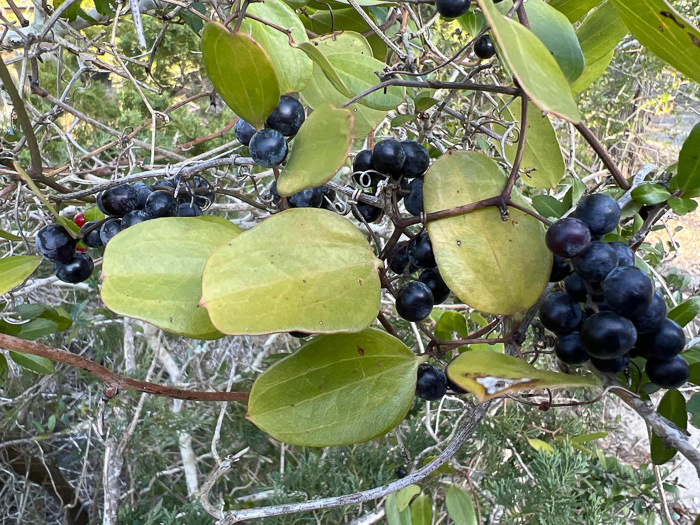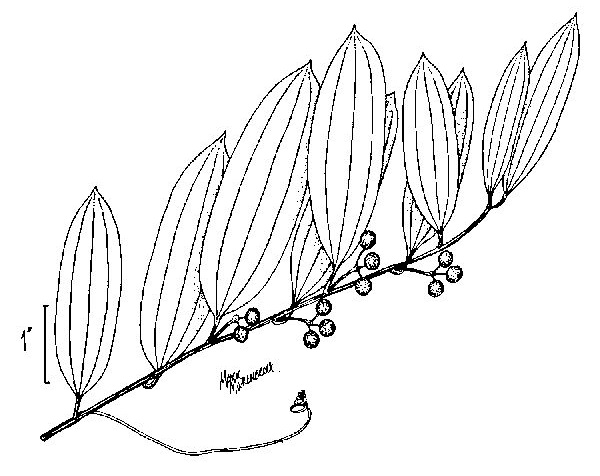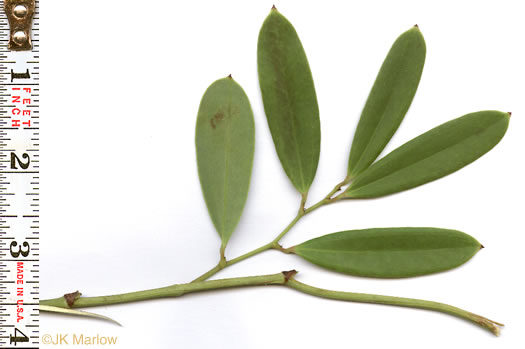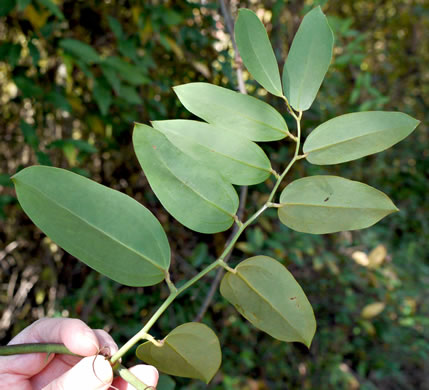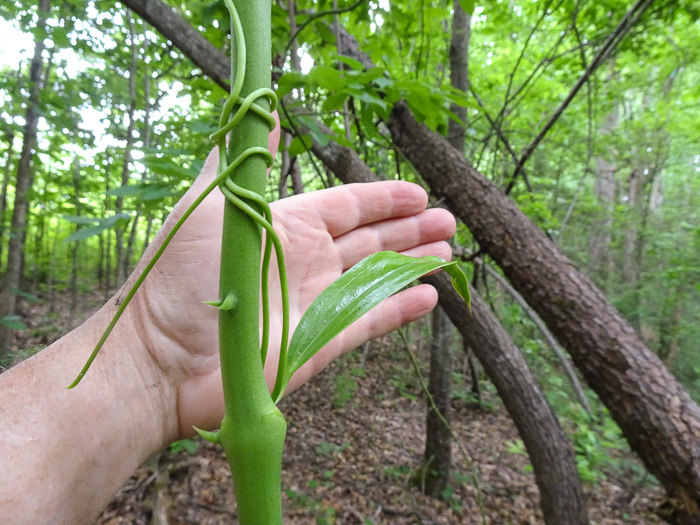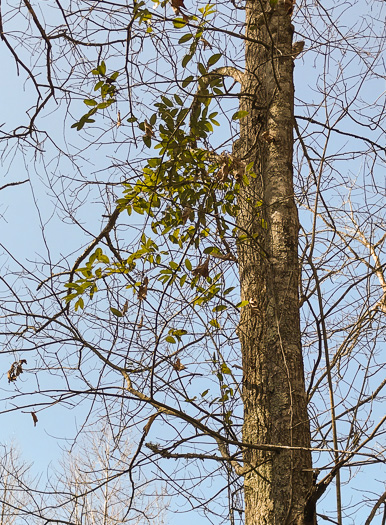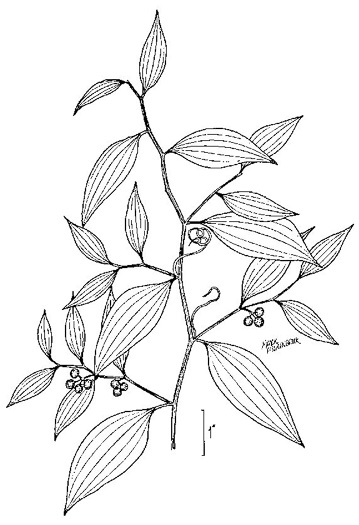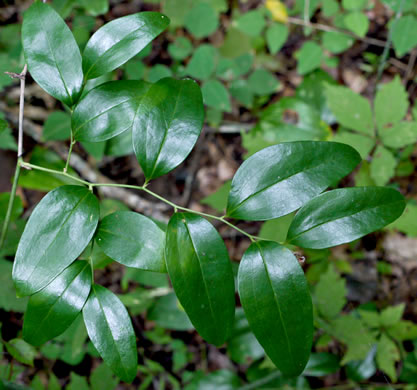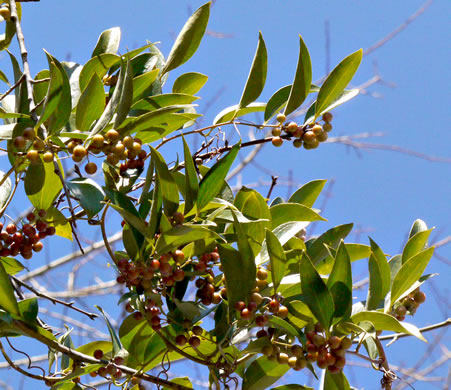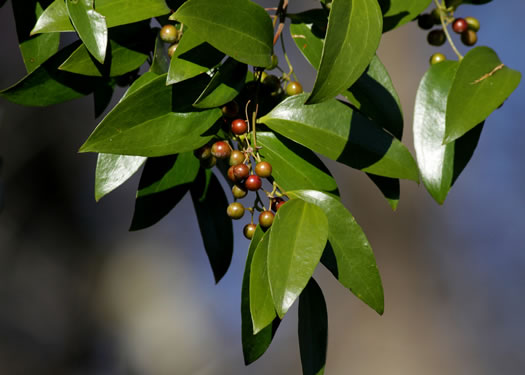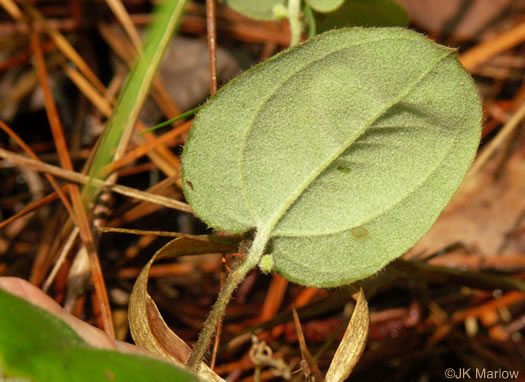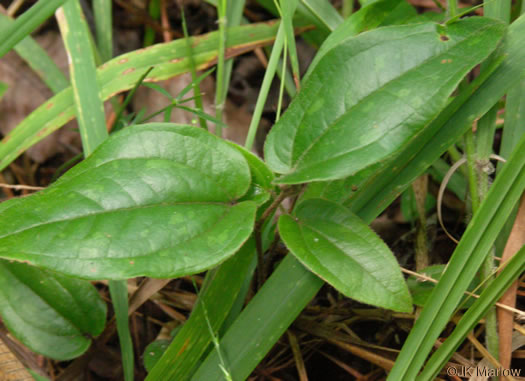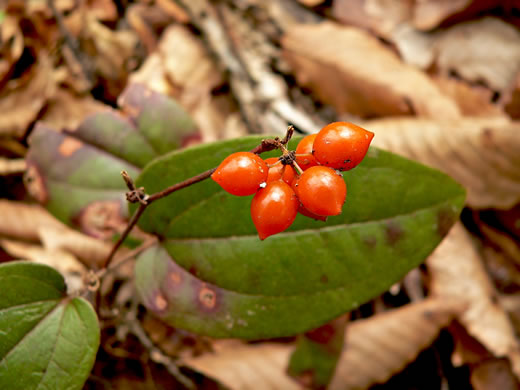Hovering over an image will enlarge it and point out features (works better on desktop than on mobile).
![]() A camera indicates there are pictures.
A camera indicates there are pictures.
![]() A speaker indicates that a botanical name is pronounced.
A speaker indicates that a botanical name is pronounced.
![]() A plus sign after a Latin name indicates that the species is further divided into varieties or subspecies.
A plus sign after a Latin name indicates that the species is further divided into varieties or subspecies.
Most habitat and range descriptions were obtained from Weakley's Flora.
Your search found 17 taxa in the family Smilacaceae, Greenbrier family, as understood by PLANTS National Database.

![]() Common Name:
Coastal Carrionflower, Bamboo-vine
Common Name:
Coastal Carrionflower, Bamboo-vine
Weakley's Flora: (4/24/22) Smilax pseudochina FAMILY: Smilacaceae
SYNONYMOUS WITH PLANTS National Database: Smilax pseudochina FAMILY: Smilacaceae
SYNONYMOUS WITH Vascular Flora of the Carolinas (Radford, Ahles, & Bell, 1968): Smilax tamnifolia 041-02-001 FAMILY: Liliaceae
Habitat: Pocosins, swamp forests, edges of pine savannas
Uncommon in Carolina Coastal Plain (rare elsewhere in GA-NC-SC)
Native to the Carolinas & Georgia

![]()
![]() Common Name:
Common Carrionflower, Smooth Carrionflower
Common Name:
Common Carrionflower, Smooth Carrionflower
Weakley's Flora: (4/24/22) Smilax herbacea FAMILY: Smilacaceae
SYNONYMOUS WITH PLANTS National Database: Smilax herbacea FAMILY: Smilacaceae
SYNONYMOUS WITH Vascular Flora of the Carolinas (Radford, Ahles, & Bell, 1968): Smilax herbacea var. herbacea 041-02-002a FAMILY: Liliaceae
Habitat: Moist deciduous forests
Common (rare in Coastal Plain)
Native to the Carolinas & Georgia

![]() Common Name:
Downy Carrionflower
Common Name:
Downy Carrionflower
Weakley's Flora: (4/24/22) Smilax pulverulenta FAMILY: Smilacaceae
SYNONYMOUS WITH PLANTS National Database: Smilax pulverulenta FAMILY: Smilacaceae
SYNONYMOUS WITH Vascular Flora of the Carolinas (Radford, Ahles, & Bell, 1968): Smilax herbacea var. pulverulenta 041-02-002b FAMILY: Liliaceae
Habitat: Moist to dry deciduous forests, especially over mafic or calcareous rocks
Common in NC Mountains, uncommon or rare elsewhere in GA-NC-SC
Native to North Carolina & Georgia

![]()
![]() Common Name:
Midwestern Carrionflower
Common Name:
Midwestern Carrionflower
Weakley's Flora: (4/24/22) Smilax lasioneura FAMILY: Smilacaceae
SYNONYMOUS WITH PLANTS National Database: Smilax lasioneura FAMILY: Smilacaceae
Habitat: Moist deciduous forests, hammocks, bluff forests, pine-oak hickory submesic forests and woodlands, rich beech-magnolia forests on lower slopes, perhaps only over mafic or calcareous rocks
Rare
Native to the Carolinas & Georgia

![]()
![]() Common Name:
Biltmore Carrionflower
Common Name:
Biltmore Carrionflower
Weakley's Flora: (4/24/22) Smilax biltmoreana FAMILY: Smilacaceae
SYNONYMOUS WITH PLANTS National Database: Smilax biltmoreana FAMILY: Smilacaceae
SYNONYMOUS WITH Vascular Flora of the Carolinas (Radford, Ahles, & Bell, 1968): Smilax ecirrhata var. biltmoreana 041-02-003a FAMILY: Liliaceae
Habitat: Dry forests (such as dry pine ridges and chestnut oak forests) and moist forests
Rare
Native to the Carolinas & Georgia

![]() Common Name:
Huger's Carrionflower
Common Name:
Huger's Carrionflower
Weakley's Flora: (4/24/22) Smilax hugeri FAMILY: Smilacaceae
SYNONYMOUS WITH PLANTS National Database: Smilax hugeri FAMILY: Smilacaceae
SYNONYMOUS WITH Vascular Flora of the Carolinas (Radford, Ahles, & Bell, 1968): Smilax ecirrhata var. hugeri 041-02-003b FAMILY: Liliaceae
Habitat: Moist deciduous forests
Uncommon (rare in Carolina Mountains & NC Piedmont)
Native to the Carolinas & Georgia

Common Name: Upright Carrionflower
Weakley's Flora: (4/24/22) Smilax ecirrata FAMILY: Smilacaceae
SYNONYMOUS WITH (ORTHOGRAPHIC VARIANT) PLANTS National Database: Smilax ecirrhata FAMILY: Smilacaceae
Habitat: Forests
Native north and west of the Carolinas & Georgia

![]()
![]() Common Name:
Common Greenbrier, Common Catbrier, Bullbrier, Horsebrier
Common Name:
Common Greenbrier, Common Catbrier, Bullbrier, Horsebrier
Weakley's Flora: (4/24/22) Smilax rotundifolia FAMILY: Smilacaceae
SYNONYMOUS WITH PLANTS National Database: Smilax rotundifolia FAMILY: Smilacaceae
SYNONYMOUS WITH Vascular Flora of the Carolinas (Radford, Ahles, & Bell, 1968): Smilax rotundifolia 041-02-004 FAMILY: Liliaceae
Habitat: Dry-mesic to mesic forests and woodlands, bottomland and riparian forests, swamps, pond margins, bluffs, flatwoods, prairies, old fields, fencerows, pastures, roadsides
Common
Native to the Carolinas & Georgia

![]()
![]() Common Name:
Fringed Greenbrier, Catbrier, Stretchberry, Tramp's Trouble
Common Name:
Fringed Greenbrier, Catbrier, Stretchberry, Tramp's Trouble
Weakley's Flora: (4/24/22) Smilax bona-nox var. bona-nox FAMILY: Smilacaceae
INCLUDED WITHIN PLANTS National Database: Smilax bona-nox FAMILY: Smilacaceae
INCLUDED WITHIN Vascular Flora of the Carolinas (Radford, Ahles, & Bell, 1968): Smilax bona-nox 041-02-005 FAMILY: Liliaceae
Habitat: Dry to mesic forests and woodlands, bottomland and riparian forests, bluffs, hardwood flatwoods, pine flatwoods, prairies, old fields, fencerows, pastures, roadsides
Common
Native to the Carolinas & Georgia

![]() Common Name:
Maritime Catbrier, Maritime Saw Greenbrier
Common Name:
Maritime Catbrier, Maritime Saw Greenbrier
Weakley's Flora: (4/24/22) Smilax bona-nox var. littoralis FAMILY: Smilacaceae
INCLUDED WITHIN PLANTS National Database: Smilax bona-nox FAMILY: Smilacaceae
INCLUDED WITHIN Vascular Flora of the Carolinas (Radford, Ahles, & Bell, 1968): Smilax bona-nox 041-02-005? FAMILY: Liliaceae
Habitat: Dunes, maritime thickets, maritime forests
Uncommon
Native to the Carolinas & Georgia

![]()
![]() Common Name:
Bristly Greenbrier, Hellfetter, Chinaroot, Chaneyroot
Common Name:
Bristly Greenbrier, Hellfetter, Chinaroot, Chaneyroot
Weakley's Flora: (4/24/22) Smilax hispida var. hispida FAMILY: Smilacaceae
SYNONYMOUS WITH (MISAPPLIED) PLANTS National Database: Smilax tamnoides FAMILY: Smilacaceae
INCLUDED WITHIN Vascular Flora of the Carolinas (Radford, Ahles, & Bell, 1968): Smilax hispida 041-02-006 FAMILY: Liliaceae
Habitat: Bottomland, riparian, and mesic upland forests, especially along brownwater rivers, and in other situations with relatively high pH and nutrients
Common (uncommon in Coastal Plain)
Native to the Carolinas & Georgia

![]()
![]() Common Name:
Whiteleaf Greenbrier, Wild Sarsaparilla, Sawbrier
Common Name:
Whiteleaf Greenbrier, Wild Sarsaparilla, Sawbrier
Weakley's Flora: (4/24/22) Smilax glauca FAMILY: Smilacaceae
SYNONYMOUS WITH PLANTS National Database: Smilax glauca FAMILY: Smilacaceae
SYNONYMOUS WITH Vascular Flora of the Carolinas (Radford, Ahles, & Bell, 1968): Smilax glauca 041-02-007 FAMILY: Liliaceae
Habitat: Dry to mesic forests and woodlands, bottomland and riparian forests, bluffs, hardwood flatwoods, pine flatwoods, prairies, old fields, fencerows, pastures, roadsides, uncommon in wetlands. One of the most ubiquitous plants in our region, and remarkable for its ecological amplitude
Common
Native to the Carolinas & Georgia

![]()
![]() Common Name:
Coral Greenbrier, Red-berried Swamp Smilax
Common Name:
Coral Greenbrier, Red-berried Swamp Smilax
Weakley's Flora: (4/24/22) Smilax walteri FAMILY: Smilacaceae
SYNONYMOUS WITH PLANTS National Database: Smilax walteri FAMILY: Smilacaceae
SYNONYMOUS WITH Vascular Flora of the Carolinas (Radford, Ahles, & Bell, 1968): Smilax walteri 041-02-008 FAMILY: Liliaceae
Habitat: Swamp forests, bogs, wooded seeps, often where submersed for at least part of the year
Common in Coastal Plain (rare in Piedmont)
Native to the Carolinas & Georgia

![]()
![]() Common Name:
Dune Greenbrier
Common Name:
Dune Greenbrier
Weakley's Flora: (4/24/22) Smilax auriculata FAMILY: Smilacaceae
SYNONYMOUS WITH PLANTS National Database: Smilax auriculata FAMILY: Smilacaceae
SYNONYMOUS WITH Vascular Flora of the Carolinas (Radford, Ahles, & Bell, 1968): Smilax auriculata 041-02-009 FAMILY: Liliaceae
Habitat: Dunes on barrier islands, maritime scrub and thickets, dry sandy openings in maritime forests or sandhills (northward, as in the Carolinas, limited to sites near the coast)
Common in Coastal Plain
Native to the Carolinas & Georgia

![]()
![]() Common Name:
Bamboo-vine, Blaspheme-vine, Wild Bamboo, Laurel-leaf Greenbriar
Common Name:
Bamboo-vine, Blaspheme-vine, Wild Bamboo, Laurel-leaf Greenbriar
Weakley's Flora: (4/24/22) Smilax laurifolia FAMILY: Smilacaceae
SYNONYMOUS WITH PLANTS National Database: Smilax laurifolia FAMILY: Smilacaceae
SYNONYMOUS WITH Vascular Flora of the Carolinas (Radford, Ahles, & Bell, 1968): Smilax laurifolia 041-02-010 FAMILY: Liliaceae
Habitat: Pocosins, swamp forests, wooded seeps and bogs, swamps, and other wetlands, often with groundwater influence
Common in Coastal Plain (rare elsewhere in GA-NC-SC)
Native to the Carolinas & Georgia

![]()
![]() Common Name:
Jackson-brier, Unarmed Catbrier, Sweet-scented Smilax
Common Name:
Jackson-brier, Unarmed Catbrier, Sweet-scented Smilax
Weakley's Flora: (4/24/22) Smilax smallii FAMILY: Smilacaceae
SYNONYMOUS WITH PLANTS National Database: Smilax smallii FAMILY: Smilacaceae
SYNONYMOUS WITH Vascular Flora of the Carolinas (Radford, Ahles, & Bell, 1968): Smilax smallii 041-02-011 FAMILY: Liliaceae
Habitat: Bottomland and riparian forests, upland forests, hardwood flatwoods, pine flatwoods, wooded seeps, stream banks, roadsides
Common in Coastal Plain of GA & SC, uncommon to rare elsewhere in GA-NC-SC
Native to the Carolinas & Georgia

![]()
![]() Common Name:
Dwarf Smilax, Sarsaparilla-vine
Common Name:
Dwarf Smilax, Sarsaparilla-vine
Weakley's Flora: (4/24/22) Smilax pumila FAMILY: Smilacaceae
SYNONYMOUS WITH PLANTS National Database: Smilax pumila FAMILY: Smilacaceae
SYNONYMOUS WITH Vascular Flora of the Carolinas (Radford, Ahles, & Bell, 1968): Smilax pumila 041-02-012 FAMILY: Liliaceae
Habitat: Mesic to dryish hammocks and bluffs, sandy forests along streams, northward primarily in maritime-influenced mainland forests
Common in Coastal Plain (rare elsewhere)
Native to South Carolina & Georgia
Your search found 17 taxa. You are on page PAGE 1 out of 1 pages.

